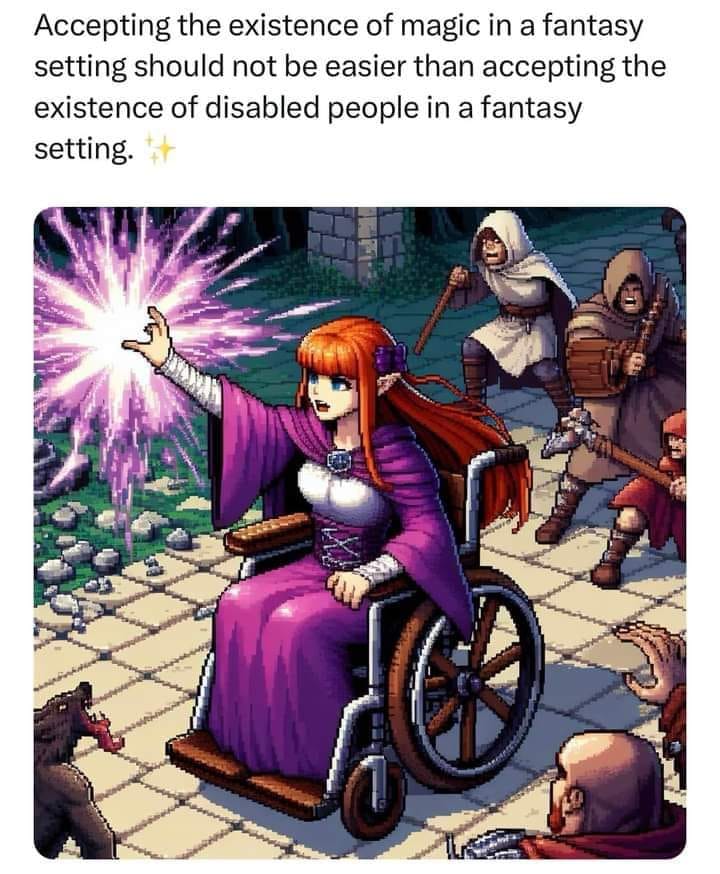this post was submitted on 10 Dec 2023
1144 points (94.3% liked)
RPGMemes
14059 readers
846 users here now
Humor, jokes, memes about TTRPGs
founded 2 years ago
MODERATORS
you are viewing a single comment's thread
view the rest of the comments
view the rest of the comments

No, I mean the question where I asked if you changed your mind because you directly contradicted yourself
Also the reason you're dumber than me is that you think I think being double jointed is a disability and you think I think I'm not disabled. You don't understand what I'm talking about at all.
I didn't contradict myself, you didn't understood what I was writing. Otherwise, please provide where I contradicted myself.
You tried to substantiate your claim that the question whether or not something is a disability depends on (social) context with mentioning that the "flaw" that Michael Phelps has supposedly aided him in being a better swimmer.
My point is that, for the definition whether or not something is categorized as a disability, it doesn't matter whether it is not disabling in certain contexts for certain individuals. Or whether you can imagine a society where it's not disabling.
"Intrinsic" and "non-intrinsic" disabilities, this differentiation does not make sense.
No I didn't. You've got it all backwards. I didn't say being double jointed is a flaw, I said being single jointed is a flaw. You didn't understand the hypothetical. You're so used to hearing people say deviations are disabilities, your brain filtered it out when I proposed that being normal is a disability. That's why I think you're worse than me at understanding hypotheticals. But the conclusion that being normal is a disability is precisely what your definition leads to. Which is why I think you don't agree with your own definition.
I pulled out what you wrote earlier:
And none of it has anything to do with my point or the definition of what makes something being categorized as a disability.
I never wrote a flaw is still a disability when everyone has it. I actually wrote the opposite but you didn't understand it.
Phelps mutation is not classified as a disability. So it is a moot example for the discussion. Even when using as a hypothetical example.
You also did not understand the definition of what makes a disability. Just because certain disabilities can lead to a benefit in certain areas for certain individuals, that neither makes the disability in general not being a disability anymore. Nor does suddenly everyone else should be classified as disabled.
I try to give an example that's perhaps easier to understand.
Blindness is considered a disability, because most people are not blind and our society, most of it's appliances, etc. are therefore build around non-blind people.
That is already part of the definition of what makes something a disability.
A (permanent) blind person will not be able to live a life equally to how they would live their life when they were not blind. And the negative effects (!) of it will be present for longer than six months.
Even when the whole world would make effort into building accommodations for blind people, it would still be seen as a disability. Although other things would change on how blind people are treated in our society.
When in a parallel universe there is an earth with humans where everybody is naturally blind, blindness wouldn't be a disability.
When suddenly superman-esque humans were born it doesn't suddenly make everyone who isn't superman-like a disabled person, but being susceptible to the negative effects of kryptonite could possibly be seen as a disability, when kryptonite was somehow part of our daily lifes.
Until the superman-like people become the defacto standard human, then the odd one born without supermanpowers would start to be seen as disabled, even though they are immune to kryptonite.
What does not make sense it to try to draw a line between intrinsic and non intrinsic disabilities. And claim that something is not a disability anymore just because people could potentially start to accommodate it better.